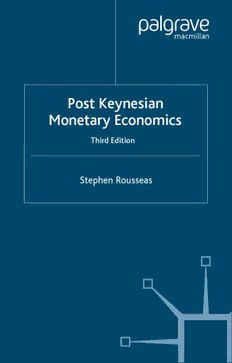
Post Keynesian Monetary Economics PDF
185 Pages·1998·0.741 MB·English
Most books are stored in the elastic cloud where traffic is expensive. For this reason, we have a limit on daily download.
Preview Post Keynesian Monetary Economics
Description:
Critiquing the rise of monetarism since the 1960s and the bowdlerization of Keynesian economics into a neoclassical general equilibrium model of the economy, Post Keynesian economics seeks to restore the original insights of John Maynard Keynes' General Theory. In a complete repudiation of the teachings of monetarism, the major emphasis is on the endogeneity of the money supply with the causal arrow running from the price level to the demand for money. The role of financial innovations is examined as the primary cause of the ineffectiveness of contemporary monetary policy through parmatric shifts of the income velocity of money curve. The main conclusion is that traditional monetary and fiscal policy cannot alone serve to stabilize the economy at full employment. Both have to be supplemented with an effective incomes policy plus and a selective control over the flow of credit in the economy. The 'general liquidity' thesis of the Radcliffe Committee Report is revived as the cornerstone of Post Keynesian monetary economics.
See more
The list of books you might like
Most books are stored in the elastic cloud where traffic is expensive. For this reason, we have a limit on daily download.
